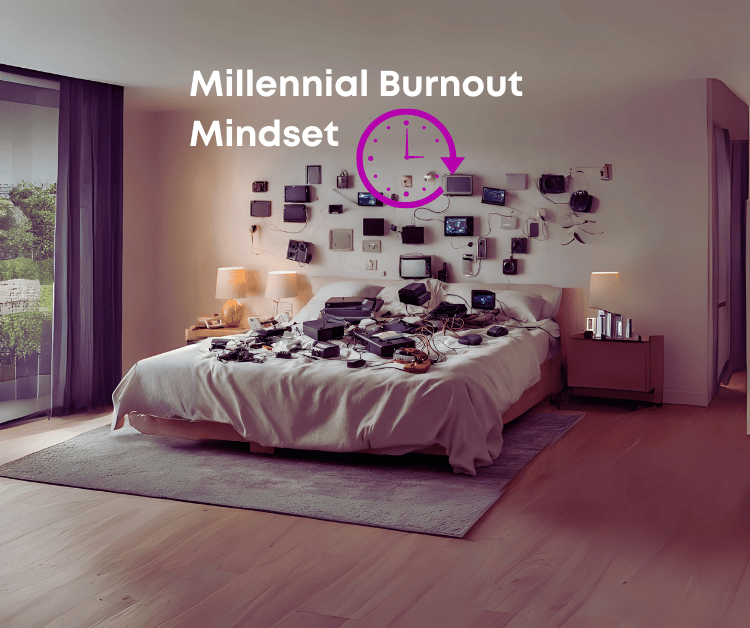
Today, let’s talk about something many of us face: the Millennial burnout mindset.
It’s this constant pressure cooker of emotions, fueled by work demands, social media, and the need to always be connected. But here’s the deal – it’s not a life sentence.
We have the power to control our mindset and overcome these challenges. So, let’s dive into some of the common pressures we face.
Do You Have The 'Always On' Millennial Burnout Mindset?
Millennials, born between 1981 and 1996, face unique challenges in a hyper-connected world. Here are 9 common pressures they encounter:
- Feeling emotionally drained from work: The constant pressure to be available and productive can lead to burnout.
- Feeling overwhelmed by social media: Excessive social media use can contribute to anxiety and depression.
- Difficulty disconnecting from work: Technology can blur lines between work and personal life, straining relationships.
- Anxiety about being disconnected: Many Millennials experience separation anxiety from their smartphones.
- Feeling unfulfilled in careers: Despite achievements, some Millennials feel a lack of purpose or satisfaction in their work.
- Pressure to succeed: Millennials often juggle multiple aspirations, leading to overwhelming pressure to excel in all areas.
- Multitasking hindering productivity: While seemingly efficient, multitasking can decrease focus and actual productivity.
- Ignoring the impact on health: Stress from the “always on” lifestyle can manifest in physical and mental health issues.
- Feeling constantly “behind”: The rapid pace of information and social comparison can create a feeling of falling behind or not keeping up.
How to Do I Stop This Millennial Burnout Mindset Cycle?
If you’re guilty of having the always-on Millennial burnout mindset, fret not; there are small yet powerful moves you can make right now to regain control and restore balance.
Here’s a list of small but impactful steps you can take:
- Set boundaries: Carve out designated “unplugged” time and silence unnecessary notifications to create moments of respite from the digital onslaught.
- Prioritize face-to-face interactions with loved ones, cherishing quality time away from screens.
- Embrace digital detoxes by taking regular breaks from technology, allowing yourself to recharge.
- Focus on activities that nourish your physical and mental well-being, such as exercise, meditation, or engaging hobbies.
- Advocate for yourself: Communicate your needs to employers, advocating for a healthier work-life balance.
Conclusion
To wrap up, the “always-on” mindset is tough, especially for Millennials.
But by recognizing its impact and taking practical steps, we can reclaim control. Prioritizing self-care, setting boundaries, and advocating for balance are key.
*As an Amazon Associate, we earn from qualifying purchases at no additional cost to you.
Let’s take small steps forward, navigating this digital age with resilience and determination.
Bonus: Bestselling Millennial Mindset Resources
- Luttrell, Regina (Author)
- English (Publication Language)
- 226 Pages - 11/22/2017 (Publication Date) - Rowman & Littlefield Publishers (Publisher)
- Birge, Kandique (Author)
- English (Publication Language)
- 165 Pages - 02/03/2024 (Publication Date) - Independently published (Publisher)
- Chanos, George J (Author)
- English (Publication Language)
- 452 Pages - 08/25/2019 (Publication Date) - Independently published (Publisher)
Related Mindset Articles on Spotted Line
Popular Questions About Always On Mindset
What is the “always-on” mindset? The “always-on” mindset means feeling constantly connected and available, often due to technology and societal pressures.
How does the always-on mindset affect us? It can lead to burnout, stress, difficulty disconnecting from work, strained relationships, and lower well-being.
Why is the always-on mindset common among Millennials? Millennials grew up with technology, making it easy to always be connected. Societal expectations also reinforce constant availability.
What are the signs of the always-on mindset? Signs include feeling drained from work, constantly checking devices, struggling to disconnect, anxiety when away from technology, and feeling overwhelmed by pressure.
How can we combat the always-on mindset? Combatting it involves setting boundaries, self-care, digital detoxes, spending time with loved ones, and advocating for work-life balance.
What are some practical tips for managing the always-on mindset? Tips include scheduling “unplugged” time, silencing notifications, exercising, prioritizing face-to-face interactions, and communicating needs with employers.
Is it possible to break free from the always-on mindset? Yes, with awareness and effort, it’s possible. By prioritizing well-being and setting boundaries, individuals can regain control over their time and mental space.






